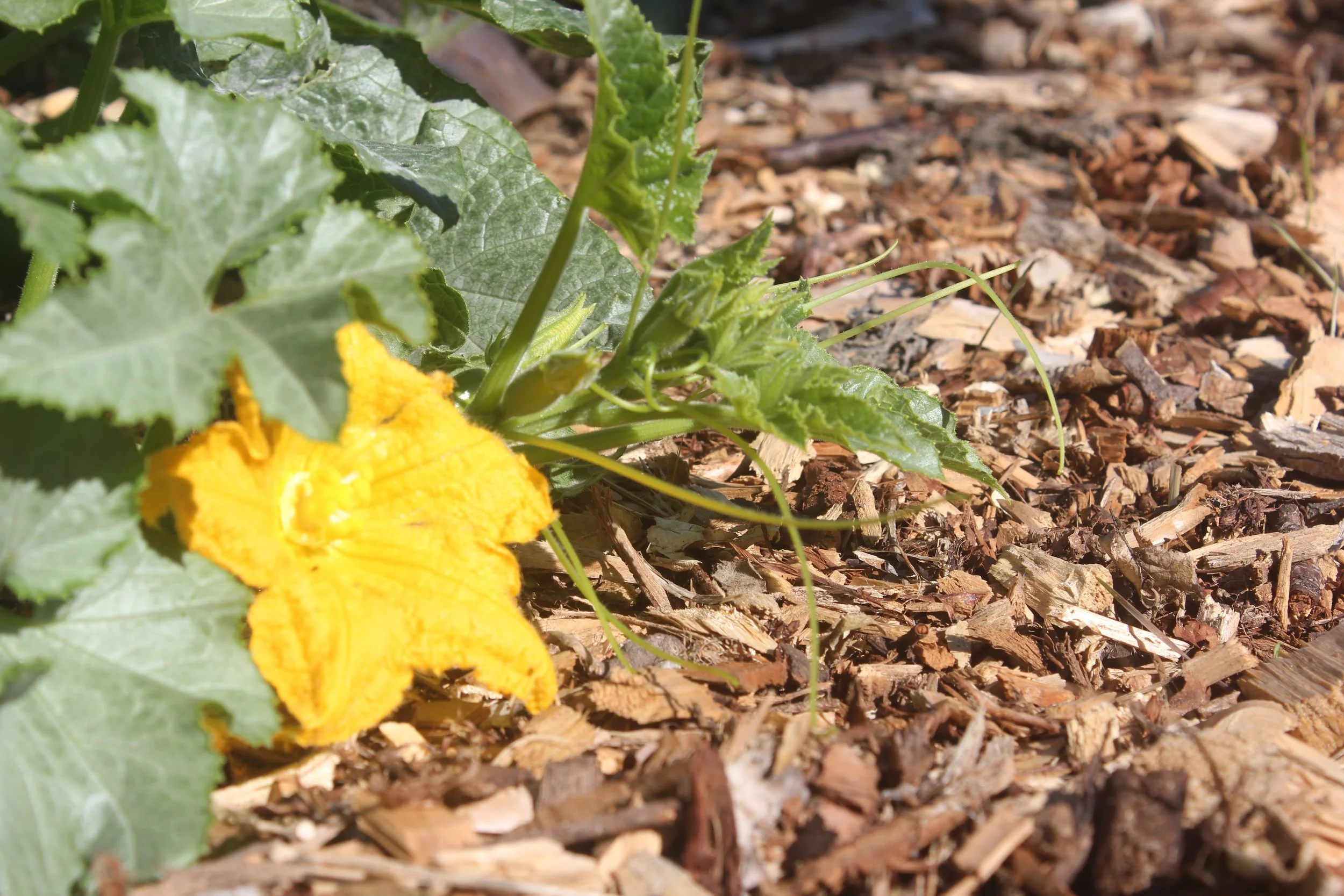OUR ECOLOGICAL APPROACH
HOW WE GROW
Our approach draws heavily on principles of regenerative agriculture, polyculture, and permaculture — though we aren’t particularly concerned with following specific terminologies or orthodoxies. We owe much of the philosophy of our approach to the Traditional Knowledge of Indigenous peoples, and our land stewardship philosophy focus on three priorities:
-
Soil health is about more than nutrient content. We are working to improve soil porosity, encourage mycorrhizal growth, and diversify microorganisms in our soil. Thus we use minimal inputs, and use no synthetic fertilizers.
-
Modern farming is a major driver of freshwater depletion. Our method of multi-story mixed planting and heavy mulching allow us to use less water than conventional crops and gardens.
-
A healthy garden needs pollinators — and pest predators too! Thus we use no pesticides or herbicides, and instead let diversity act as pest control.
SOIL HEALTH
Promoting soil health is critical for growing healthy crops, and sustaining that production in the long-term.
Studies have consistently demonstrated that healthy soils — those with high porosity, balanced nutrient content, and diverse microorganisms — improve yields and stabilize ecosystems.
Yet modern agriculture relies heavily on chemical inputs (such as fertilizers, insecticides, and herbicides) which reduce the prevalence and diversity of these beneficial microbes. Conventional farms also commonly practice annual tilling, which harms beneficial soil life and contributes significantly to topsoil erosion.
In contrast, organic and no-till practices have been shown to increase soil porosity (which helps it absorb and retain water) as well as improve microbe diversity and populations — which in turn increase nutrient availability for plants.
That’s why at RSF, we never use synthetic inputs and don’t practice conventional annual tilling. Instead, we compost our plant waste on-site, supplement it with organic compost donated by partners, and actively cultivate fungal networks through edible mushroom cultivation and mycorrhizal inoculation of our plant starts.
Figure above courtesy of Lehman et al. (2015).
WATER USE
Worldwide, agriculture accounts for 70% of all freshwater consumption. As the world’s freshwater resources dwindle, conventional farmers are increasingly at loggerheads with residential communities, indigenous nations, and conservation scientists alike.
At RSF, we heavily mulch our crops, avoid tilling, and plant crops densely to ensure that we are using our freshwater resources efficiently. This approach has the added benefit of mitigating flooding and the negative impacts of drought in our increasingly tumultuous climate. And with each year that we successfully increase the organic matter in our soil, we need less and less water to sustain our plants.
If we meet our fundraising goal for the 2023 growing season, we will be able to invest in rainwater collection and drip irrigation, which will further cut our on-site water consumption. You can contribute by becoming a member, or supporting our holiday fundraiser.
BIODIVERSITY: FOR POLLINATORS & PEST MANAGEMENT
Nature abhors a vacuum, which is unfortunately exactly what most common pesticides and herbicides create — and those approved for Organic agriculture are no exception. Most pesticides target a broad range of pests, but can harm pollinators and other beneficial insects too. After using pesticides, plants are left defenseless against the next invaders, thus creating “an artificial ecosystem that requires constant human intervention and extra running costs.”
We take a radical approach to pest management: strategic nonintervention.
Strategic nonintervention means that we plan our growing season for a balance of food crops and plants that provide pollinators food and shelter. We also consider potential problems with pests and diseases before planting. By doing both before gardening season, we draw biodiversity in, and with it, competition.
This does mean that sometimes, plants will be munched on for a short time before a beneficial predatory insect stops by to make a meal out of what’s eating our plants.
The benefits of strategic nonintervention, however, far outweigh the nuisance of a few Swiss cheese leaves among our otherwise pristine plants.
By letting diversity handle pest management for us, we completely eliminate the considerable costs of conventional pesticides as well as save labor time. We also protect the diverse pollinators that sustain the health of our open-pollinated plants. But most importantly, we avoid contributing to the triple-threat that pesticide use poses for soil health, water quality, and biological diversity.
At the peak of the 2022 growing season, the landscapes we manage supported 11 beehives. On our main farm, we hosted four beehives, as well as native ground-dwelling and mason bees, hummingbirds, butterflies, and more! We bring these benefits to our landscaping clients as well. Our 100 square foot pollinator mini-gardens (currently offered in our holiday fundraiser) can each provide enough nectar and pollen to support hundreds of bees! If every home with a grass lawn in the Portland Metro Area installed just one of our pollinator gardens, we would create an urban oasis in a desert of global insect decline.




